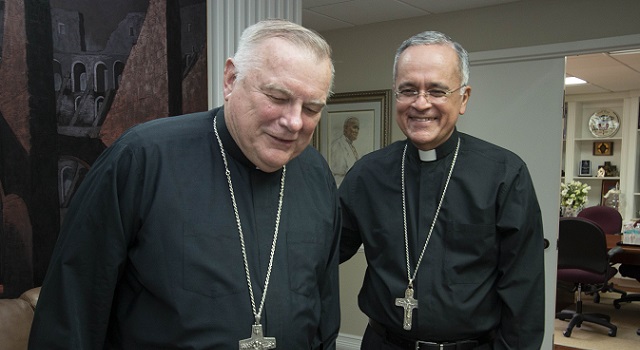By Rocio Granados - La Voz Catolica
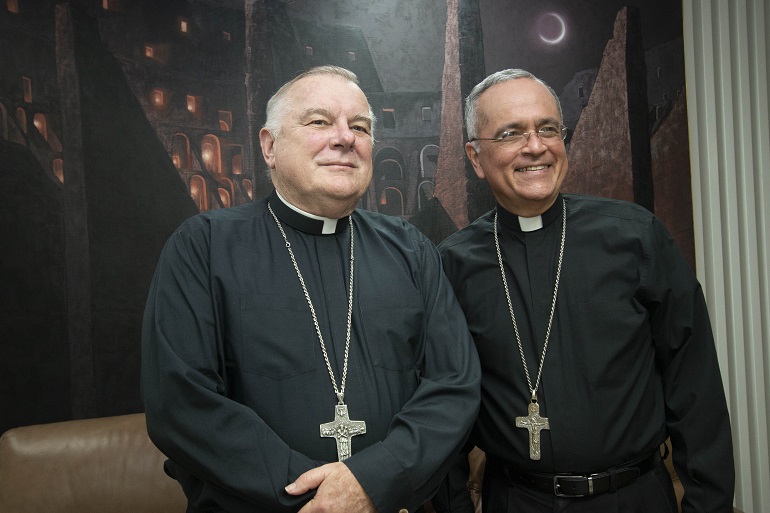
Photographer: ANA RODRIGUEZ-SOTO | FC
Archbishop Thomas Wenski poses in his office with Managua Auxiliary Bishop Silvio Báez, who visited April 26 during a stop in Miami before traveling to Rome, where he has been called by Pope Francis after a series of death threats.
MIAMI | In an exclusive interview days before traveling to Rome, Managua’s outspoken Auxiliary Bishop Silvio Báez said his country “is a nation kidnapped” by a government that has entrenched itself through “the destruction of democratic institutions, lies and corruption.”
“Add to that the violent and criminal repression and abuse of human rights and personal liberties” over the past year, he told La Voz Católica April 26, and what you have is a government “that has practically kidnapped all personal, social and political freedoms.”
Bishop Báez stopped in Miami the week after Easter to visit with family members. He had been called to Rome by Pope Francis after receiving death threats for his open and strong stance against the government of President Daniel Ortega and his wife and vice president, Rosario Murillo.
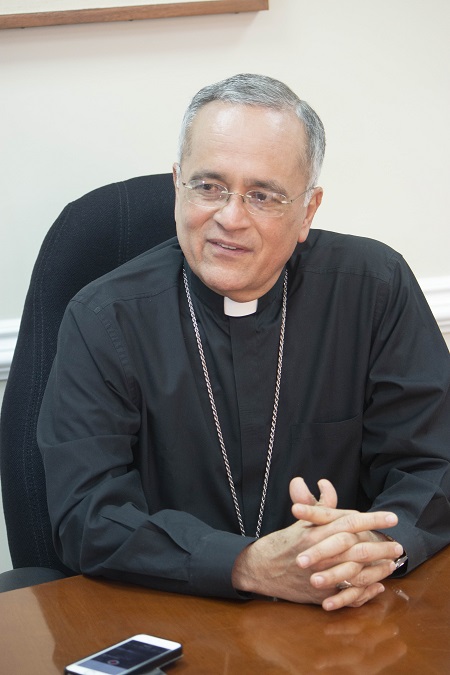
Photographer: ANA RODRIGUEZ-SOTO | FC
Managua Auxiliary Bishop Silvio Báez is interviewed April 26 by Rocio Granados of La Voz Catolica. He has just visited with Archbishop Thomas Wenski during a stop in Miami before traveling to Rome, where he has been called by Pope Francis after a series of death threats.
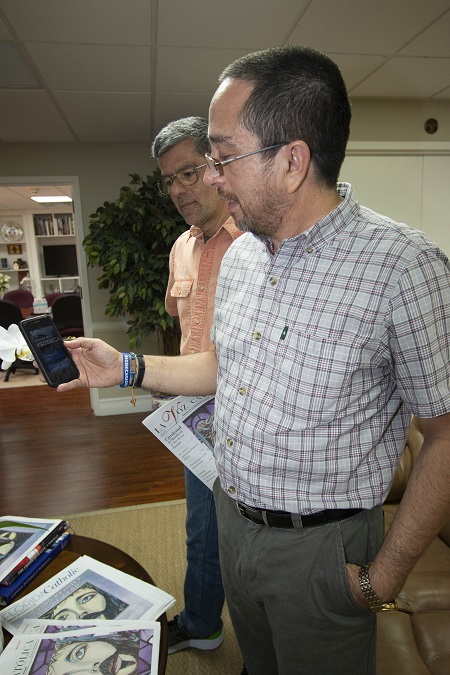
Photographer: ANA RODRIGUEZ-SOTO | FC
Bishop Silvio Báez's younger brothers, Luis Felipe Báez, left, a resident of Canada, and Javier Báez, who moved with his family to Miami seven months ago, look at the website where Javier Baez keeps a listing of the political prisoners currently jailed by Daniel Ortega's government. The site is www.nicaspresospoliticos.org.
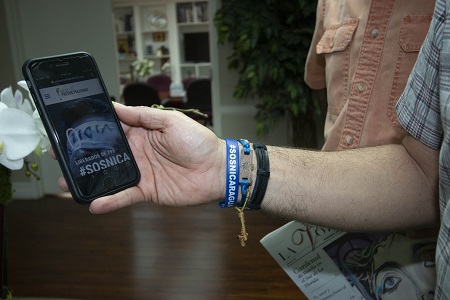
Photographer: ANA RODRIGUEZ-SOTO | FC
Bishop Silvio Báez's younger brother, Javier Báez, who moved with his family to Miami seven months ago, shows the website where he keeps a listing of the political prisoners currently jailed by Daniel Ortega's government. The site is www.nicaspresospoliticos.org.
During his brief stay in Miami, he met with Archbishop Thomas Wenski at the archdiocesan Pastoral Center and, on April 28, celebrated Mass at St. Agatha Church in Sweetwater surrounded by an enthusiastic multitude of Nicaraguan exiles. (See accompanying story.) The next day, he flew to Rome.
During the interview with La Voz, the archdiocese’s Spanish-language newspaper — an interview which can be read in its entirety, in Spanish, at https://bit.ly/2H0hmcG — Bishop Báez denied that any coup d’etat was afoot, as Ortega’s government claims.
He said for years, the populace expressed little interest in participating in Nicaragua’s political and social life. But on April 18, 2018, that passivity ended unexpectedly. The trigger was a change to the social security system, which coincided with a fire at the Indio Maíz Biological Reserve, an important ecological site. University students in Managua began protesting, and those protests soon spread nationwide.
BOILING POINT
“It was a boiling pot, years in the making,” he said. “The young people were the ones who blew up April 18 because they were seeing a great number of abuses of all types.”
He foresaw that something had to give, but he never expected it to happen when it did, or to start with the young people, he said. “We thought we had a youth that was asleep, interested only in their cell phones and soccer and parties. And now we have a good number of martyrs, of lads who have given their life for their homeland.”
The government’s response made the situation even worse.
“The government’s response was criminal,” the bishop said. “It armed civilians, the so-called paramilitaries, who together with the government’s police have taken us to at least 300 documented deaths.” He added that nearly 1,000 people have disappeared, nearly 800 are political prisoners, thousands have fled the country and thousands more have lost their jobs.
Those actions have caused the government to lose all legitimacy, Bishop Báez said. “Its only means of remaining in power is through weapons.”
In fact, the repression has reached such an absurd point that waving the national flag or singing the national anthem can land people in jail.
NATIONAL TRAGEDY
“It’s a national tragedy and the only way out is for the current government to leave,” the bishop said. “Nicaragua cannot move forward, nor can it rebuild, with Daniel Ortega in power, because of the way he has acted not just this year, but by dismantling democracy since he acquired power in 2007.”
The people are calling for the government to resign or hold early elections, which would be perfectly legal under the constitution, Bishop Báez said. He urged that diplomatic pressure, and even economic sanctions, be applied by international bodies such as the Organization of American States and human rights “in order to avoid worse bloodshed.”
“No one in Nicaragua wants a violent solution, but the government is closing off all the possible peaceful solutions,” he said.
He stressed that this is not a civil war, like that of the 1980s when Ortega and his Sandinista National Liberation Front fought the Contras for power. “Back then it was a conflict between two armed groups. This is a police state that has armed its paramilitaries, its anti-riot police and the national police against an unarmed populace.”
After the violence last year, the Catholic Church served as mediator in a national dialogue. Bishop Báez said the dialogue failed due to the government’s “intransigence and lack of political will.” After that, Ortega and Murillo’s hatred for the Church turned visceral, and the bishops were branded “overthrowers, criminals, assassins and even possessed by the devil.”
Despite that, he said, the latest polls have found that the Catholic Church is viewed as “the most credible institution” in the country.
CHURCH’S ROLE
Another dialogue is underway between the government and a group representing the people, the Alianza Cívica por la Justicia y la Democracia (Civic Alliance for Justice and Democracy).
“As bishops we decided not to take part and to give the laity their place in political and social life,” Bishop Báez said. “At bottom, we did not want to be used or manipulated politically because the majority of bishops don’t believe in those negotiations. We think they’re not going to be successful.”
He said the proper role of the Church is not political but pastoral. Although those who have committed “crimes against humanity” will have to “face justice,” the Church has enormous work to do. “Hearts that have been destroyed will have to be healed through the healing grace of Jesus Christ.”
Speaking as a shepherd and believer, he added that the only way to “uproot evil is through forgiveness and reconciliation.” And that will require a lot of catechesis on the part of the Church.
As for his own situation, “I have not asked to leave Nicaragua, and if I am leaving at this moment it’s out of loving obedience to the vicar of Peter,” he said.
He noted that he has no property or family left in Nicaragua, as all his family also has gone into exile. Some, like a younger brother who has lived in Canada for 30 years, never returned from their initial exile in the 1980s.
“The only reason I have not wanted to leave is not to abandon a people who trust in the Church, who wait every moment for their pastors to be the voice of those whose voice is very weak or who no longer have the strength to express themselves.”
He added that he is proud of the work being done by Nicaragua’s Church.
“We have risen to the historical challenges facing the nation. This is a grace of God, not our own merit, but we have been able to, through words and witness, offer consolation, light, strength to a crucified people.”
